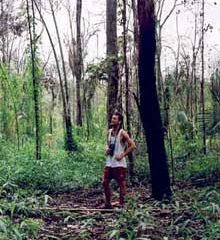This complex theme deals primarily with interactions between organisms and the environmental factors that impact them, but to a greater extent between individual inanimate environmental factors.
innovations-report offers informative reports and articles on topics such as climate protection, landscape conservation, ecological systems, wildlife and nature parks and ecosystem efficiency and balance.

Unless the pace of global warming is abated, polar bears could disappear within 100 years, says a University of Alberta expert in Arctic ecosystems.
While it has been known for some time that the polar bear is in trouble, new research shows that Arctic ice–the polar bear’s primary habitat–is melting much faster than scientists had believed, says U of A biologist Dr. Andrew Derocher.
“The climate predictions coming out are showing massive changes in sea-ice distribution,” sa

University of Colorado at Boulder researchers have found, ironically, that two pollutants – carbon dioxide and hydrocarbons emitted from agricultural forest trees – offset each other somewhat in mitigating air quality problems.
Carbon dioxide, believed by scientists to be a major factor in greenhouse warming, has been shown to reduce “agriforest” emissions of hydrocarbons that contribute to ground-based ozone pollution, according to CU-Boulder doctoral candidate Todd Rosenstiel of the envir

More trees are dying following forest fires in the Amazon than was previously thought, according to new research from the University of East Anglia (UEA).
Trees that initially appear to survive fires, such as those caused by El Niño, are in fact dying two to three years later, increasing carbon emissions and causing further loss of Amazonian vegetation.
Dr Barlow of UEA’s School of Environmental Sciences found that many of the large, thicker-barked trees that survive up to two years fol

The flora and fauna are sending signals about the impact of global warming – a message that is being heard in backyards around the world.
A study in the Jan. 2 edition of the British science journal Nature synthesized data from 143 scientific papers to examine whether a signal, or “fingerprint,” of climate change can be found in how animals and plants have reacted to increasing temperatures.
Among their findings: In the temperate zone, the researchers estimate that, for spe

Life expectancy and prosperity will continue to rise and food production should keep up with population growth, but the Kyoto agreement will have little effect on global warming according to this week’s Christmas issue of the BMJ.
Using official statistics and global trends, Bjørn Lomborg, Director of the Danish Environmental Assessment Institute and author of The Skeptical Environmentalist attempts to draw a reasonably good picture of the true state of the world.
Life expectancy fo

What’s seven feet long, 250 million years old, and currently lurking in the depths of Oregon’s Rogue River? It’s the green sturgeon, the craggy, shark-like fish that has quietly eked out a living since the time of the dinosaurs. But according to a new study published by researchers from the Bronx-Zoo based Wildlife Conservation Society and other groups, this living fossil is extremely vulnerable to both overfishing and habitat alteration such as water diversion for irrigation and pollu